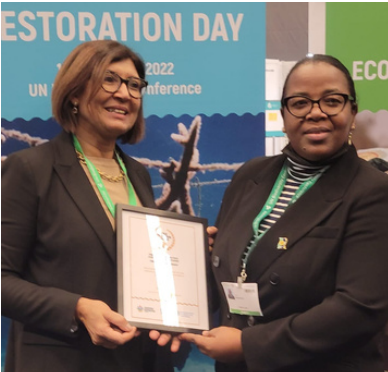THE INITIATIVE WAS ONE OF TEN WINNERS FROMM AROUND THE WORLD.
 The United Nations (UN) has recognized Saint Lucia in its collaborative role with Vanuatu and Comoros for their Small Island Developing States Restoration Drive. It was one of ten winning initiatives from around the world, dubbedWorld Restoration Flagships fortheirrole in restoring the natural world. The announcement was made at the ongoing UN Biodiversity Conference (COP15) in Montreal.
The United Nations (UN) has recognized Saint Lucia in its collaborative role with Vanuatu and Comoros for their Small Island Developing States Restoration Drive. It was one of ten winning initiatives from around the world, dubbedWorld Restoration Flagships fortheirrole in restoring the natural world. The announcement was made at the ongoing UN Biodiversity Conference (COP15) in Montreal.
Saint Lucia’s delegation-lead in Canada is Permanent Secretary Anita Montoute. “With support from UNDESA, FAO, and UNEP,” she said, “we look forward to the transformation of the challenges we face in our conservation and restoration efforts, to opportunities that will concretize partnerships that will enhance our efforts and bring the needed capacity building, financial and technical support to our countries. This kind of support is needed to exemplify the decisions around the goals and targetsthat areto be agreed on in thecoming days here at COP 15. The success of the flagship initiative will depend on the effective and strategic mobilization of resources to address coordinated ecosystem restoration.”
The Small Island Developing States Restoration Drive is focused on scaling up ridge-to-reef restoration of unique ecosystems and tapping blue economic growth to help island communities rebound from the COVID-19 pandemic. Goalsinclude a reduction in pressures on coral reefs, which are vulnerable to storm damage, so that fish stocks can recover. Ecosystems under restoration also include seagrass beds, mangroves, and forests. As well as creating a “toolbox” of solutions for sustainable island development, this flagship aims to amplify the voice of island nations facing rising sea levels and intensifying storms as a result of climate change.
Montoute explained: “In Saint Lucia, the Flagship will build on ongoing ef orts to help local communities in the South East Coast area, to identify alternative sustainable livelihood opportunities in addition to increasing the value of existing activities such as fishing through more sustainable practices. The Flagship will increase opportunities forenhancing collaboration between government, the privatesector,communitybased and non-governmental organizations, with vested interest in conservation ef orts. Leveraging publicprivate partnerships and theengagement of the youth are key forecosystem management.”
In Vanuatu, the Flagship will support the co-development of Marine Protected Areas management plans, between the managers and local communities in North Efate and the Maskelyn Islands, and will ultimately ensure better integration of indigenous and local knowledge. In Comoros, the Flagship will be working towards financing incubator programmes to develop private sector partnerships with local businesses. If successful, this approach can be applied to other Marine Protected Areasin Comoros and scaled up acrossthe Flagship and the wider SIDS community.
As a World Restoration Flagship, the Restoration Drive is eligible to receive UN-backed promotion, advice, orfunding. Montoute asserts, “Paramount to measures that willresult in ef ectiverestoration and conservation, is the issue of finance. The smallness and competitive nature of our economy constrain us in prioritizing national allocations in our annual budget to sustain related conservation work. For Saint Lucia, availability of and access to grant funding has been reduced because of the country’s classification as an upper middle-income country. Like other countries, Covid-19 has impacted the economy and the debt situation has worsened resulting in a tighter fiscal space…Beyond the 5 years of this Flagship, we must already begin to determine if there are unexplored nature-related financing instruments that can supplement flagship financing and that are less onerous to access. We are already contending with the bureaucracies of the climate finance sphere and should not have to add to this, our ef orts to reduce biodiversity loss as we attempt to managethetriple planetary crisis.” Montoute made the statements as a panelistin a Rio Conventions Pavilion event at COP15.
Together, the ten inaugural World Restoration Flagships aim to restore more than 68 million hectares and create nearly 15 million jobs. The Flagshipsfall underthe banner ofthe UnitedNations Decade on Ecosystem Restoration, a global movement designed to prevent and reverse the degradation of naturalspaces acrossthe planet.
View Anita Montoute Address here:shorturl.at/wxKZ7